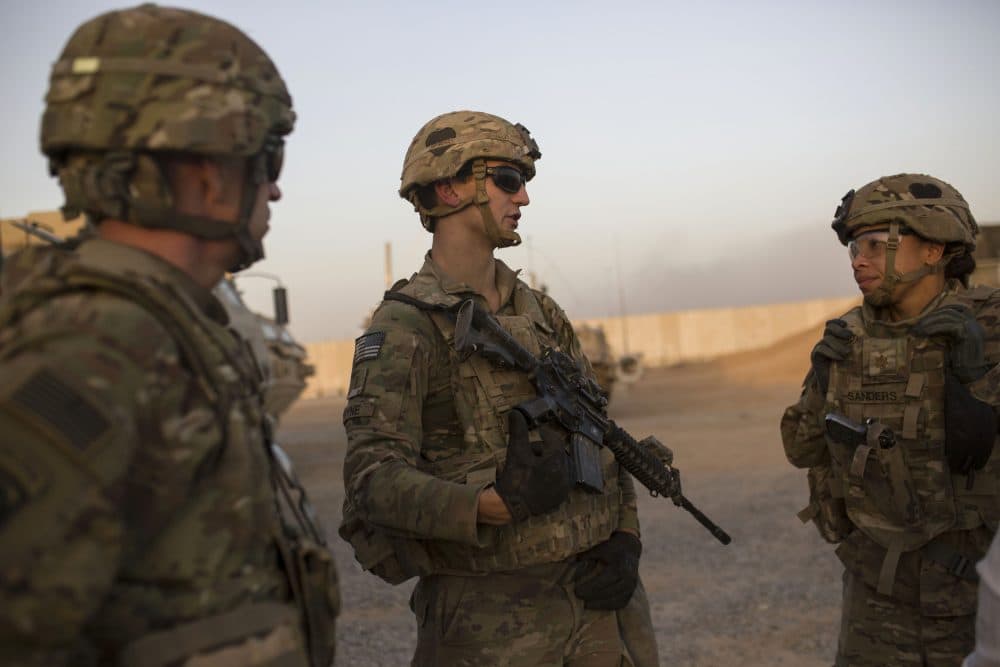Advertisement
Can A Boost In Defense Spending Help Defeat ISIS?
Resume
President Trump wants to boost military spending by $54 billion, and he also has a new plan to defeat the Islamic State on his desk. That plan could involve more U.S. troops on the ground in Syria.
Here & Now's Jeremy Hobson asks military analyst Andrew Bacevich to assess both. Bacevich is a professor emeritus of international relations at Boston University's Pardee School of Global Studies.
Interview Highlights
On Trump's remark that the U.S. needs to "start winning wars again"
"It affirms my belief that he's unqualified to be commander-in-chief. The question, I think, that we should focus on is the question of, 'Why don't we win?' And will simply shoveling more money at the Pentagon produce wins, produce victory? And I'd have to hear the argument that would persuade me that that's the case, and I don't think any such argument exists."
On the campaign against ISIS and where Trump's plan fits
"I think the campaign against ISIS is succeeding. Now, success is coming incrementally, success is being achieved at enormous cost — particularly to Iraqi forces. But it's happening. Whether or not adding a handful of additional American troops, whether that will accelerate the pace of success, I don't know. I suppose it will, but I think the larger point is it really begs the larger question, which is not simply, 'What do we need to do to defeat ISIS?' But, 'What can be done, what should be done to address the larger problems that afflict the region?' And I'd argue that ISIS really is a symptom of the larger problems. So people talk a lot about military strategy as if sending an additional brigade of U.S. forces to the region is a strategy — it's not a strategy, there is no strategy. There's not even a discussion of strategy, as far as I can tell, in the foreign policy establishment."
"The larger question has to be, toward what end? What is the strategy? What is the problem that spending an additional $54 billion a year is going to solve?"
Andrew Bacevich, on President Trump's plan to increase defense spending
On President Eisenhower's concerns about the military-industrial complex
"He was right. There is a military-industrial complex. The clout that the military-industrial complex exercises today is not as great as the clout that it exercised back when Eisenhower was in office. That is to say, that military spending is a far smaller part of both our national economy in a smaller proportion of the federal budget, but there's no doubt that corporate interests — in particular corporate interests that are invested in maintaining high levels of military spending — are gonna get attended to by people in Washington, far more than the voices that are calling for improvements in public education, or investments in health research."
"...Again, the question is, what for? Why do we need to spend an additional $54 billion? Where will that money go? How much of it will go to purchasing costly weapons, as opposed, for example, to improving the readiness of U.S. forces that have been abused and misused over the past 15 years, and therefore probably need a certain amount of attention in order to get them back up to speed? But the larger question has to be, toward what end? What is the strategy? What is the problem that spending an additional $54 billion a year is going to solve?"
Advertisement
On civilian control of senior national security positions
"I think that, individually, people like [Secretary of Defense James Mattis] and [national security adviser H.R. McMaster] are seasoned, talented, capable, well-intentioned. But as a matter of course, I'm opposed to having our senior national security positions so dominated by military officers. I think that it chips away at the principle of civilian control. That's a principle that Americans take for granted. And I think that, actually, President Trump's infatuation with military with military officers and his propensity to put them in these senior positions is actually indicative of the way that we are losing sight of the importance of that principle. We're a country of, what, 325 million people? Seems to me that there are some folks out there who haven't spent their life in uniform, that actually probably have the qualifications to serve as defense secretary, to serve as national security adviser, and I for one would like to see those positions filled by people who have lived their lives, their professional lives, in the civilian world rather than in the military world."
This segment aired on February 28, 2017.